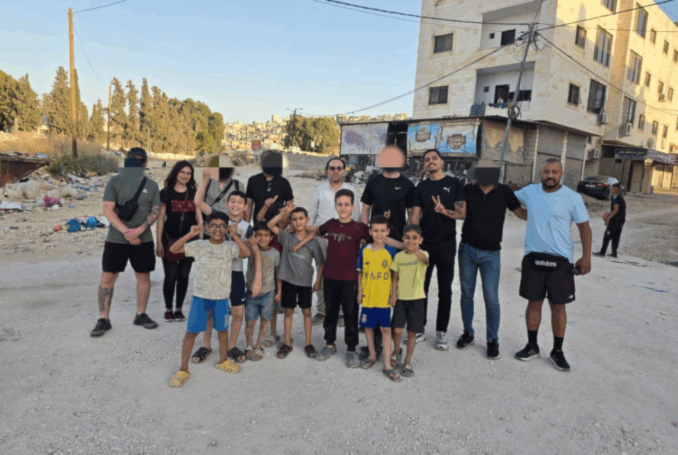‘Sport changes everything’: Brazilians visit Palestine in solidarity
During their solidarity visit to Palestine, Brazilian football fans faced racist remarks from Israeli occupation forces, highlighting the daily discrimination Palestinians endure.
-

Representing Brazil, the president and a member of São Paulo's Independente fan club visited Palestine. (The Palestine Chronicle)
Contributing to The Palestine Chronicle, Brazilian journalist Enrico Di Gregorio explores how football fandom is evolving into a form of international solidarity with Palestine. In a recent initiative, members of Sao Paulo FC’s Independente supporter group traveled to the occupied West Bank, visiting refugee camps and local sports centers. Their journey is part of a growing global movement that connects football culture to the Palestinian struggle, blending sport, cultural exchange, and shared resistance.
The solidarity journey emerged from the "Show Israel the Red Card" campaign launched by Celtic FC’s Green Brigade in March. The campaign quickly gained international traction, drawing the support of fan groups from Spain’s Osasuna and Deportivo Alavés, Italy’s Livorno, Pisa SC, and Lecce, Chile’s Palestino, Malaysia’s Terengganu, Greece’s Atromitos FC, and Brazil’s Independente.
By May, two months after the campaign's debut, activists were organizing trips to Palestine. Representing Brazil were Matheus Marcelo and the president of Independente, both also members of the Bonde do Che (Che’s Gang) collective, named after revolutionary icon Che Guevara.
View this post on Instagram
“The goal of the trip is to learn about the reality of the Palestinian people, how the Zionist occupation works and what they go through on a daily basis,” Marcelo told Brazilian newspaper A Nova Democracia. The visit also aimed “to learn about their project with Lajee Celtic in the Aida refugee camp, and the other refugee camps around Palestine, so that we can help.”
Connecting through struggle
The Green Brigade’s invitation was a direct result of Independente’s visible support for Palestine during matches in Brazil, often waving Palestinian flags and displaying pro-Palestinian banners in stadiums. The connection deepened when a Che’s Gang member living in Scotland helped establish contact with Celtic’s activist supporters.
“We visited Tulkarm, al-Khalil, Jenin and Aida,” Marcelo recounted. “Tulkarm and Jenin are completely devastated because of Israel’s actions. We saw Israeli soldiers and snipers during our visit to Tulkarm.”
Photos and videos taken during the delegation’s visit show the scale of destruction, crumbling buildings, defaced maps in schoolrooms, and heavy surveillance. “We went to the roof of the school, but I could not film the refugee camp, because it had snipers aiming at us,” Marcelo said.
“Daily life is filled with oppression,” he added. During one of their crossings, their guide was detained, handcuffed, and beaten at an Israeli checkpoint. Marcelo believes that the guide was only released because he was accompanied by Scottish members of the Green Brigade. “We, from Brazil, had to show our passports several times because, according to the Israelis, we had ‘a Palestinian face’.”
Life under the occupation
Al-Khalil left a particularly lasting impression. “The settlers have closed a lot of stores, but there are a few left that are trying to survive,” Marcelo said, describing the central market area where Israeli settlers have built homes atop Palestinian businesses. Access to these areas is heavily restricted, and a fence now separates Palestinian stores from the settlement houses above.
“In the past, Israelis used to throw garbage and stones at Palestinians walking along the market street,” he added.
For Marcelo, the harsh conditions in the occupied West Bank evoked memories of Brazil’s impoverished favelas. “It began with tents and, over time, it has practically become a city,” he explained. “It’s like the favelas, which started with a few shacks and, with the arrival of more people, the creation of commerce and the passage of time, became almost neighborhoods, cities.”
View this post on Instagram
He also found emotional and cultural parallels between the communities. “The Palestinian people have a very strong collective sense. They are very similar to us Brazilians, they like to make friends,” he said.
As in Brazil’s favelas, Palestinian communities also support one another through shared hardship and mutual aid, particularly in the face of state violence and lack of basic services. “The only thing they asked of us is to talk about Palestine, to show the justice behind it to the Brazilian people,” Marcelo noted.
Youth empowerment through sports
At the heart of their visit was the Lajee Center, a youth cultural and athletic facility in the Aida refugee camp. “Children study other languages like English and French, do gymnastics, boxing, dance. They have a series of projects to strengthen the community,” Marcelo said.
The center also hosts a local football team known for its talent and community influence. “Many young Palestinians wait to get into the team,” he added. “This work is important because it offers a new perspective to all Aida residents, because the team is famous and attracts supporters from all over the world to the Palestinian cause.”
The Green Brigade’s partnership with the Lajee Center deepened after UEFA fined them for displaying Palestinian solidarity banners at a match. In response, the group raised more money than required to cover the fine, and donated the remainder to Lajee.
“Sport changes everything, and it’s the fans who keep everything going,” Marcelo said.
As their journey concluded, members of Independente and Bonde do Che returned home with renewed purpose and stronger ties to the Palestinian struggle. Plans are already underway to support new initiatives and keep the message alive, both in Brazil and beyond.

 5 Min Read
5 Min Read










